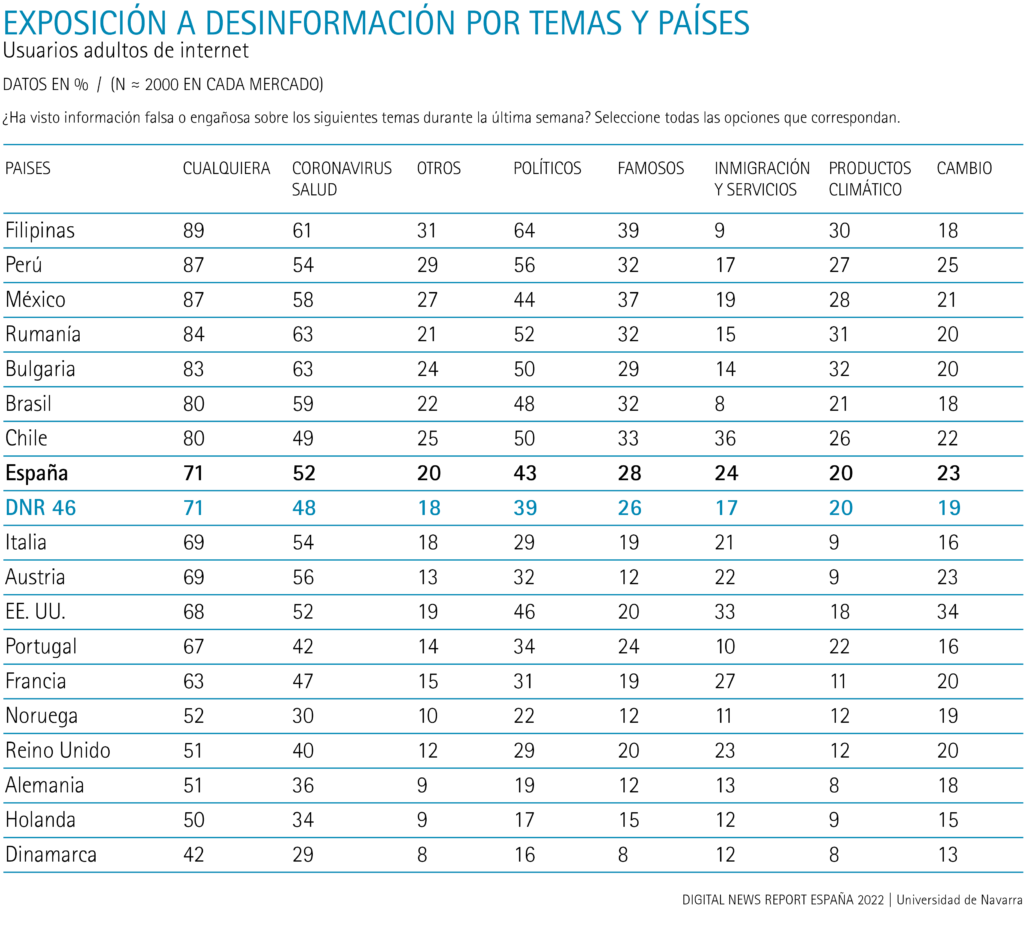-
It is perceived that most of the media put their particular interests before those of society in general.
-
Although still high, public concern about information hoaxes is decreasing (62%).
One of the reasons that may explain the loss of trust in the news is the widespread perception among respondents that the Spanish media are not independent with respect to political or business groups. To learn more about this problem, this year's survey has recovered the questions posed in 2017. The data shows an increase of issue of Spaniards who consider that usually the media are not independent of pressure from politicians (from 57% in 2017 to 61% in 2022) or business groups (from 55% in 2017 to 57% in 2022). Only 13% of Spanish users trust the independence of the media from politicians and 15% from commercial influences, five points less than in 2017.
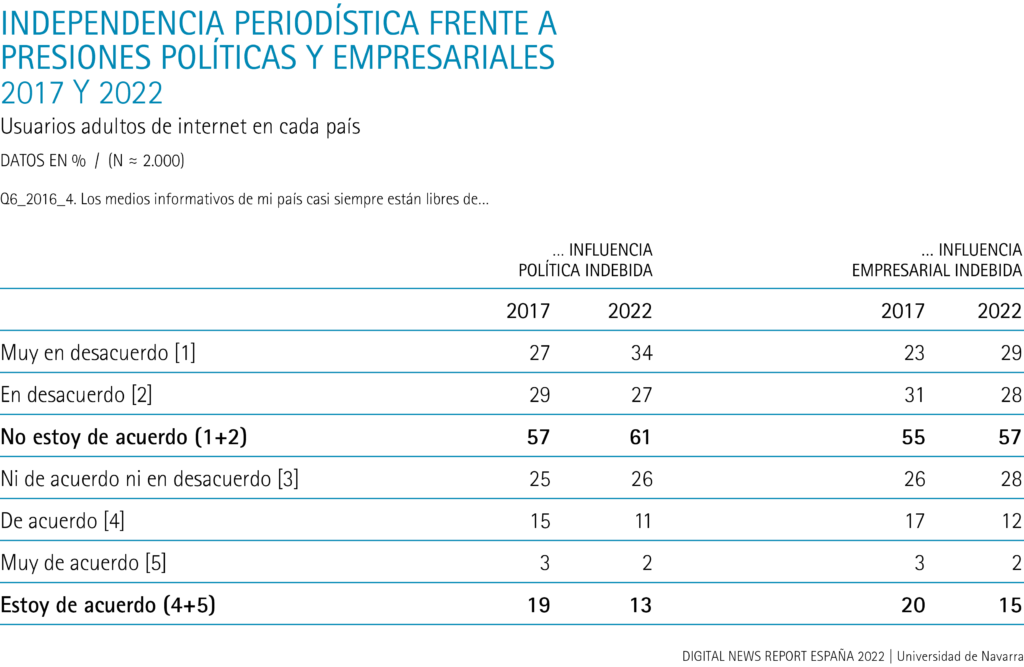
This perception of lack of independence is much more acute among the youngest than among the oldest. Adults under 25 years of age mostly believe that the media are not independent from politicians (68%) and businessmen (61%), compared to the more favorable perception of those over 35 years of age (61% and 56%, respectively).
Finally, the comparison with the rest of the countries where survey has been carried out does not leave Spanish media companies in a good position. In the 46 countries analyzed, 57% of those surveyed consider that the media are not independent from political or governmental pressure groups (compared to 19% who believe they are) or from business pressures (55% and 20%, respectively). Thus, Spain is the country with the second worst public perception of the independence of its media companies from political pressures -only behind Greece (7%) and sharing place with Italy (13%)- and from commercial pressures -behind Greece (8%) and equal with Hungary, Slovakia, Bulgaria and Italy (15%). Spain's data are far from the Degree of journalistic independence perceived in countries such as the Nordic countries, Denmark, Germany, South Africa or the Netherlands, above 40%.
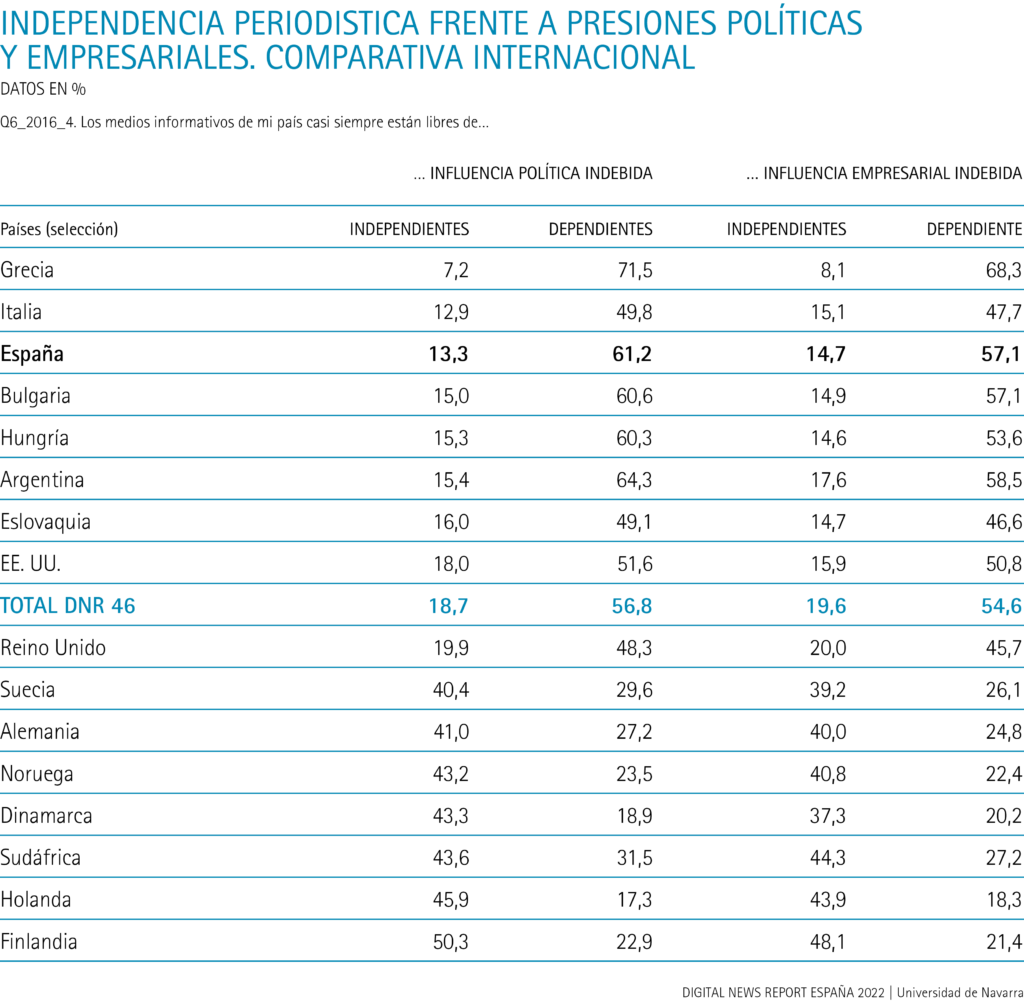
Primacy of self-interest over the common good
Closely related to the Degree of independence, this year's survey raised some questions about the social role played by the media in the general interest. Specifically, it asked respondents' opinion on whether or not the media put their commercial and political interests before what is best for society. The general perception in Spain is that all or most of the media subordinate the general interest to their commercial (56%) or political (53%) interests. In contrast, only 11% of those surveyed consider that news companies put the common good before their commercial interests or political opinions (14%).
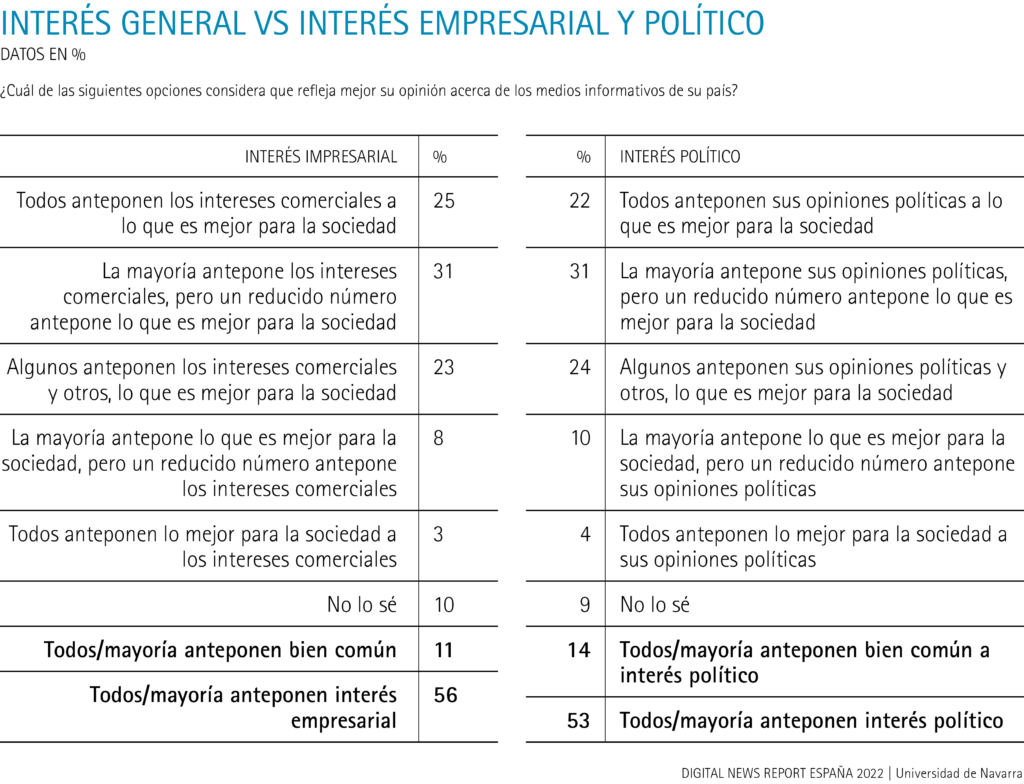
The analysis by age bracket sample shows that this negative perception of the media in Spain is transversal to all generations, although younger people have a slightly more positive view than older generations: 15% of those under 35 years of age believe that the media put the general interest of society before the commercial interests of the companies themselves, compared to 10% of those over 55 years of age. The same trend is observed for political interests: 17% of those under 35 believe that most of the media subordinate their political opinions to the common good, compared to 10% of those over 55.
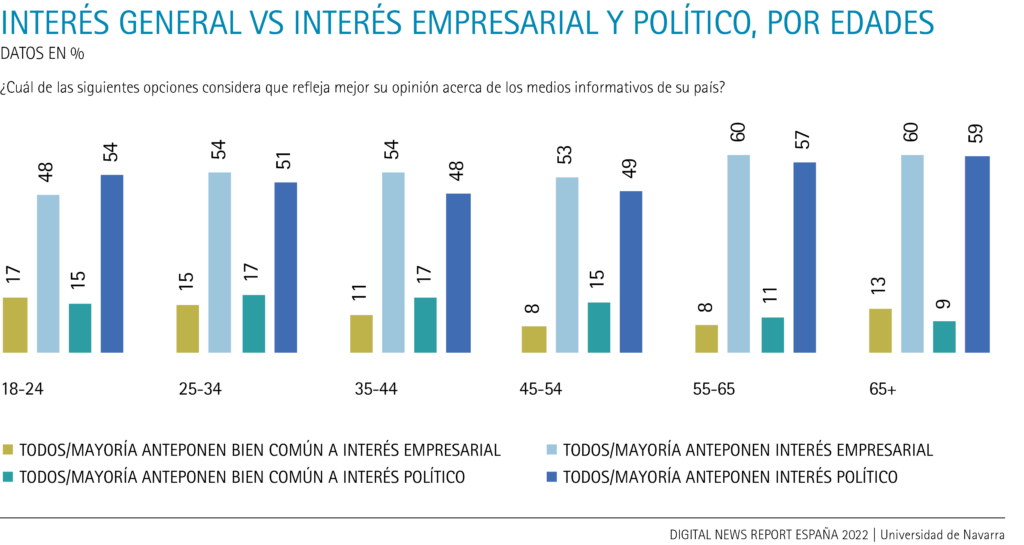
This negative view of the media with respect to the general interest of society is also reflected in most of the countries analyzed. Thus, the majority of those surveyed consider that media companies put their business interests (42%) and their political opinion (40%) before the common good. However, the figures are significantly worse in the case of Spain: it is the fourth country in which most people consider that journalists put their commercial interests before the general interest, only behind Greece (68%), Croatia (66%) and Romania (58%) and far behind Finland (19%), Denmark (20%) and Norway (23%).
As regards the primacy of the political opinions of each media outlet with respect to the general interest of society, Spain's data are again comparatively worse than those of most countries: it is the fourth country in which most citizens consider that the media put their political interests before those of society, behind Greece (66%), Croatia (56%) and Turkey (54%).
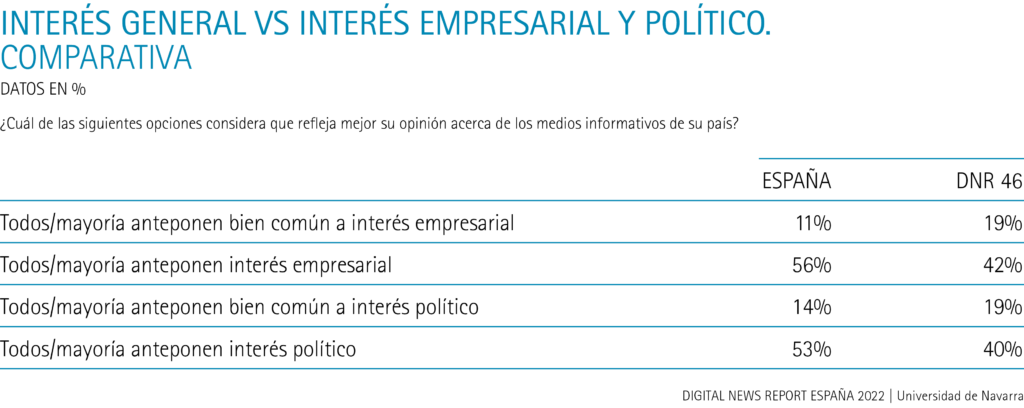
Spanish media, politically distant
This year's survey wanted to know the perception of Spaniards regarding the political distancing of the country's main media. Almost half (49%) consider that the main Spanish news companies are very distant from each other, from an ideological point of view, compared to 36% who believe that they are close to each other. If we compare it with the rest of the countries where this question has been asked, we observe that Spain is the country with the second highest perception of ideological distance between the media, only behind Poland (54%). In the 43 countries where this question was asked, the majority of those who consider that the media companies are closer politically (51%) than distant (31%).
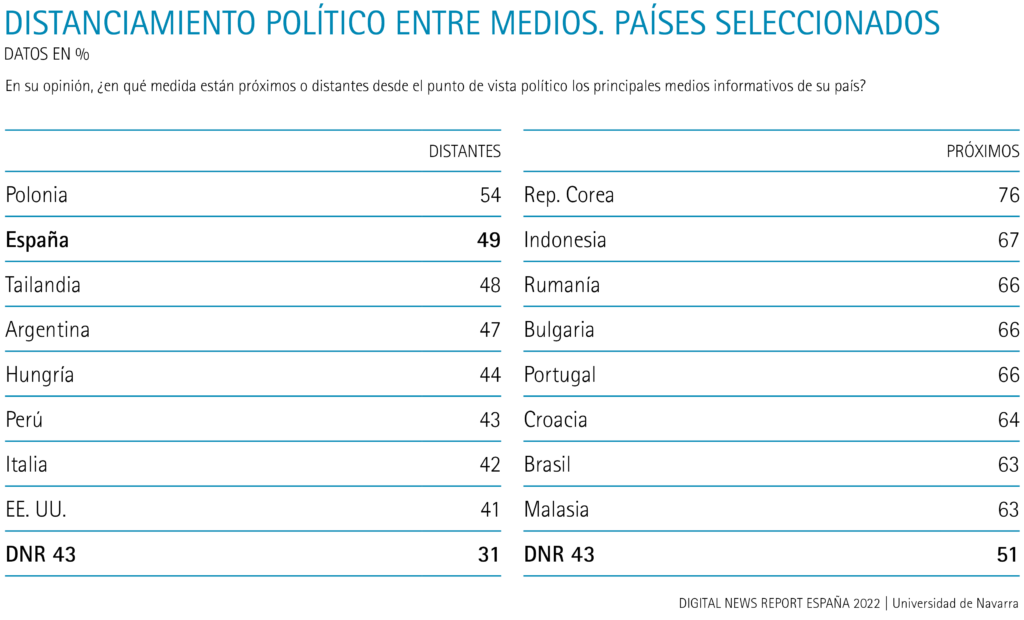
However, the analysis by age sample, once again, shows significant differences between the perception of the youngest and the oldest in Spain. While nearly 60% of those over 55 years of age consider that there is political distancing between the country's main media, almost half (49%) of adults under 24 years of age perceive the opposite, that there is a great political proximity between them.
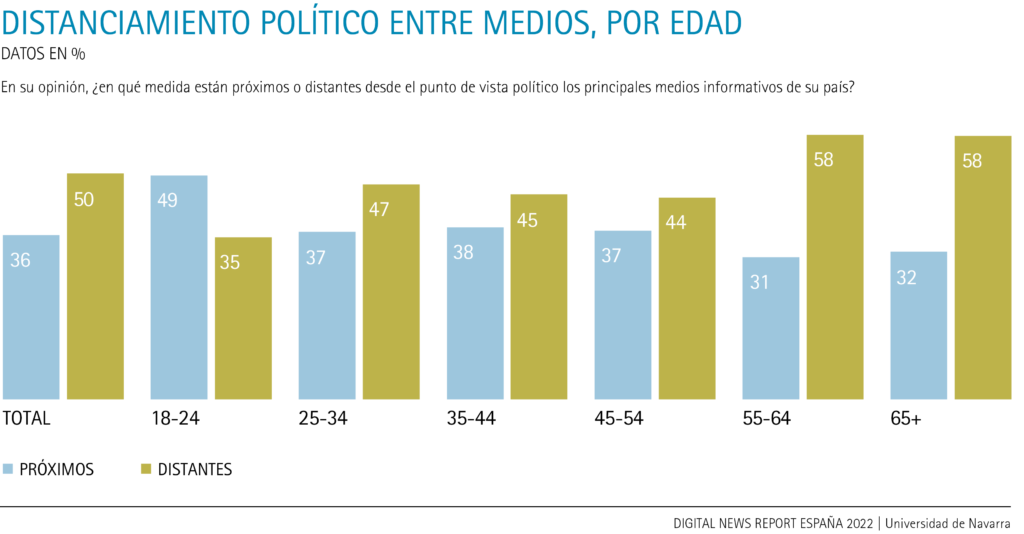
Last but not least, it should be pointed out that the widespread perception that Spanish news companies are politically distanced can be viewed from two points of view. On the one hand, a greater distance is synonymous with a greater Degree pluralism of information, which is desirable and necessary for the proper functioning of a democracy. But on the other hand, a great political distancing can be perceived as a sample of political and informative polarization, origin of serious social fractures.
Concern about the proliferation of hoaxes persists, although less so
Spain continues to be one of the countries most concerned about the proliferation of hoaxes, although with less intensity than in previous years. The data of the Digital News Report Spain 2022 shows that 62% of Spanish respondents are concerned about knowing what is true and what is false about the content circulating on the internet, compared to 12% who say they are not interested in this issue. This is the most leave concern in Spain since 2018, when this question was first asked in the Digital News Report. That year, 69% of respondents said they were alarmed by hoaxes, seven points more than in 2022.
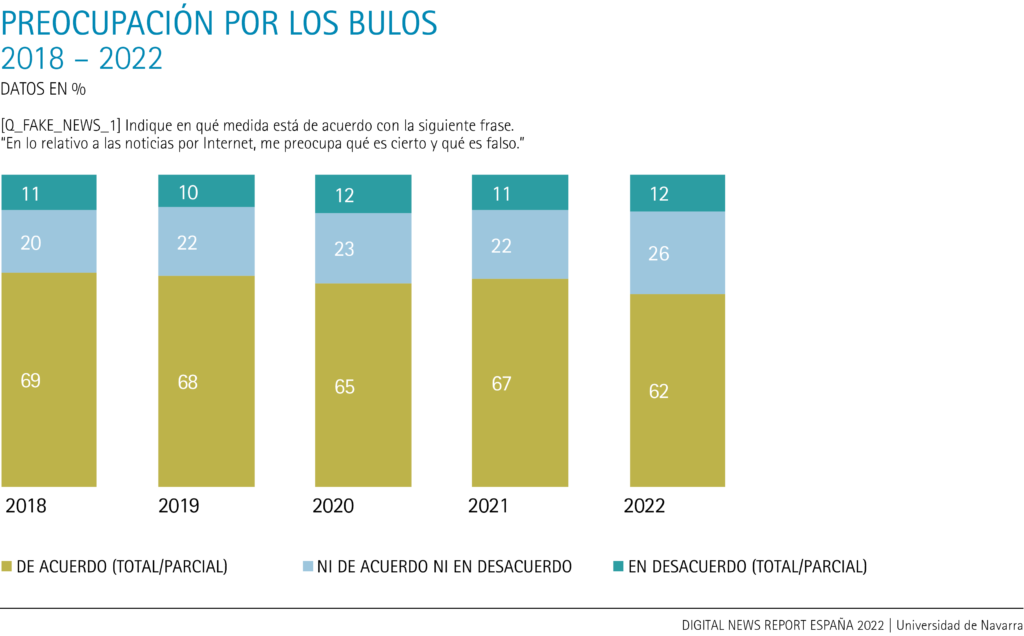
Despite this tendency to leave, the figures are still high compared to the rest of the 46 countries analyzed (54% of the total surveyed are concerned compared to 16% who are not), and especially in comparison to the rest of Europe: Spain is, after Portugal, the European country with the greatest citizen concern about disinformation, at a great distance from countries such as Austria, Germany, Denmark or Norway (+- 33% are concerned).
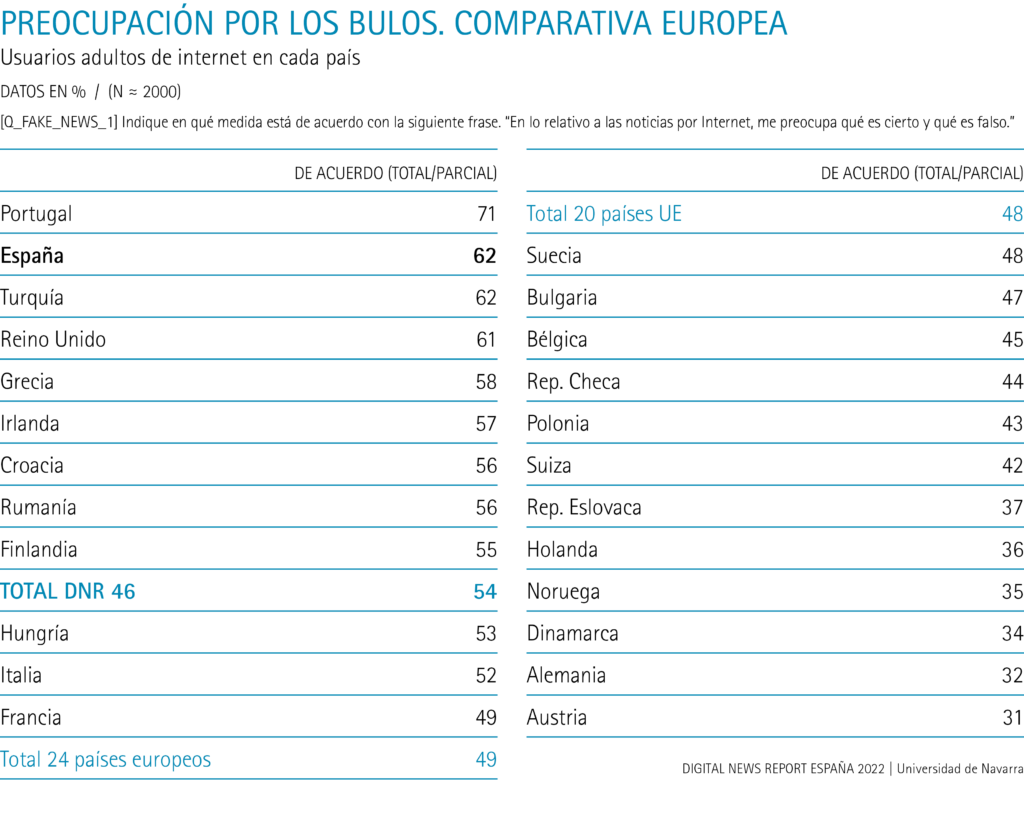
The analysis by sociodemographic variables shows little change in Spain. Women (65%) are more concerned about disinformation than men (59%), and concern about hoaxes increases with age: 56% of those under 55 years of age state their concern compared to 70% of those over that age.
Finally, data shows that this lower concern has been paralleled by a decrease in the exhibition of the respondents to the aforementioned hoaxes. Seventy-one percent of Spaniards claim to have seen some false or misleading information subject during the week prior to the survey, four points less than in 2021. The main hoaxes had to do with health issues (56%) especially covid-19 (52%), followed by politics (43%). At a greater distance, other important issues about which Spanish citizens have received misinformation are celebrities (28%), immigration (24%) or climate change (23%).
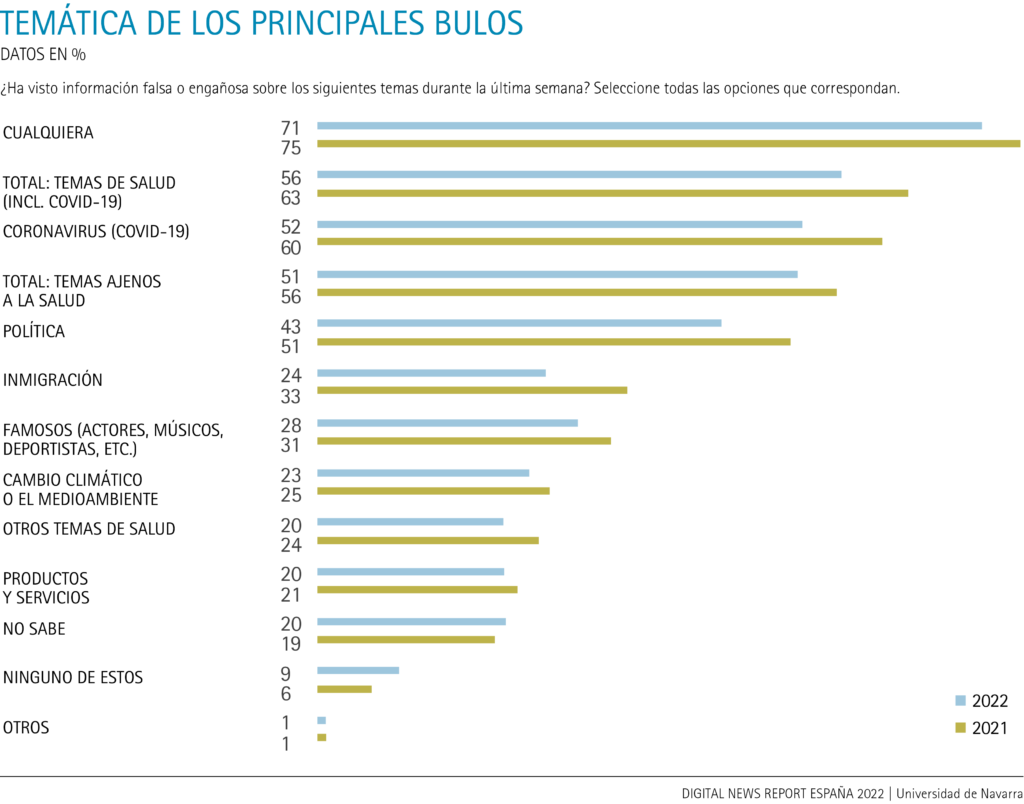
In comparison, the exhibition of Spaniards to hoaxes is very similar to the average of the 46 countries analyzed (71%) but higher than most European countries such as Denmark (42%), Holland, Germany, United Kingdom (50% approx.), Norway (52%) or Belgium (57%).
